形容词和副词比较级和最高级变化规则
英语形容词和副词的比较级和最高级
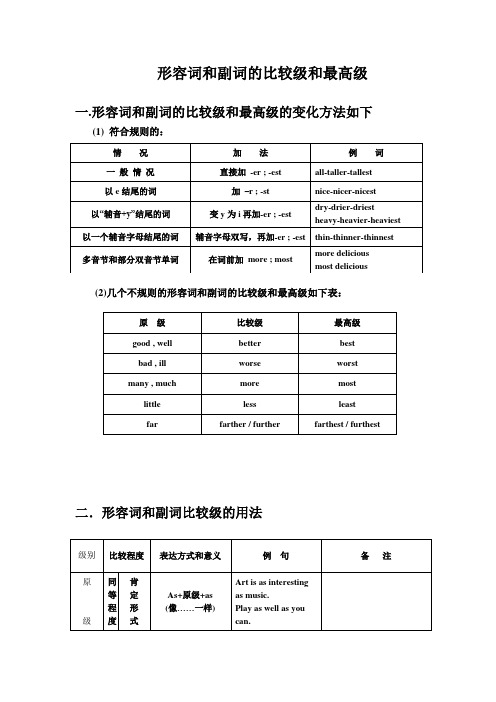
形容词和副词的比较级和最高级一.形容词和副词的比较级和最高级的变化方法如下(1) 符合规则的:(2)几个不规则的形容词和副词的比较级和最高级如下表:二.形容词和副词比较级的用法注意:有些形容词,如 dead, empty, round, sure, woolen 等受本身含义的限制,没有比较级。
例题解析1. He is ________ friends than I.A. much moreB. many moreC. very moreD. too more解析:后面有可数名词复数时,many的比较级形式为many more 修饰。
应选B.2. Which is the _________ country, Japan or Australia?A. more developedB. more developingC. most developedD. most developing解析:两者比较用比较级,表示"发达"用developed, 而developing 是"发展中的" 意思3. There were _______ shops in the city in 1982 than in 1990.A. littleB. fewC. fewerD. less解析:little 不能修饰可数名词,两者比较需用比较级,所以应选C.4. If you are not free today, come another day __________.A. tooB. soC. insteadD. yet解析:instead 作副词用时意为"代替,顶替",表示前面的事情没做,而是做了后面的事。
Instead一般位于句首。
应选C.5.He can't tell us ________, I think.A. important anythingB. anything importantC. important somethingD. something important.解析:不定代词与形容词联用需后置,否定句中应该用anything而不是something. 因此应选B6. The Huang River is the second __________ river in our country.A. longB. longerC. longestD. the longest解析:"定冠词the+ 序数词+ 形容词最高级" 表示"第几大……" 应选C.7. The light in the office wasn't ________for him to read.A. enough brightB. bright enoughC. brightlyD. enough brightly解析:enough修饰名词时可前可后,修饰形容词或副词时,要后置。
形容词和副词比较级和最高级变化规则

形容词和副词比较级和最高级变化规则
1.单音节词和部分双音节词:
- 在比较级前面加more,最高级前面加the most。
例如:happy(快乐)- happier(更快乐)- the happiest(最快乐)。
2.以字母e结尾的形容词和副词:
- 在比较级前面直接加r,最高级前面加st。
例如:large(大)- larger(更大)- the largest(最大)。
3.以辅音字母+y结尾的形容词和副词:
- 把y变为i,在比较级和最高级前面加er和est。
例如:happy (快乐)- happier(更快乐)- the happiest(最快乐)。
4.以一个元音字母加一个辅音字母结尾的重读闭音节形容词和副词:
- 双写结尾的辅音字母,再加er或est。
例如:big(大)- bigger (更大)- the biggest(最大)。
5.以重读闭音节结尾的不规则形容词和副词:
- 保持原形不变,在比较级和最高级前面加er和est。
例如:good (好)- better(更好)- the best(最好)。
6.以多音节形式或以-y结尾的多音节形容词和副词:
- 在比较级前加more,最高级前加the most。
例如:beautiful(美丽)- more beautiful(更美丽)- the most beautiful(最美丽)。
需要注意的是,有些形容词和副词的比较级和最高级是不规则的,需要单独记忆。
例如:bad(坏)- worse(更坏)- the worst(最坏), little(小的)- less(较小的)- the least(最小的)。
形容词和副词的比较级和最高级(完美版)
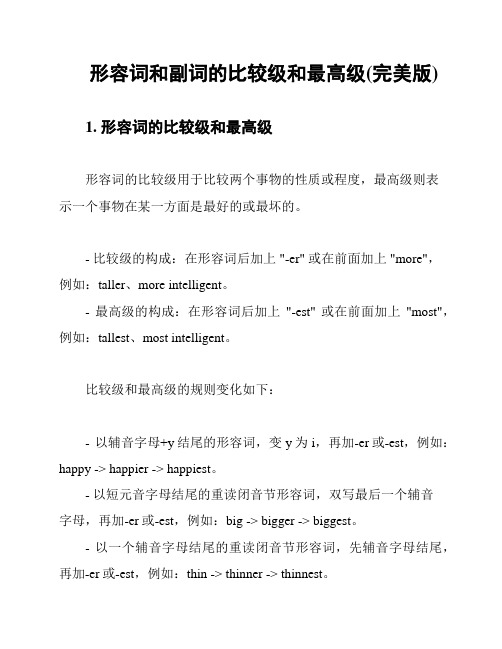
形容词和副词的比较级和最高级(完美版)1. 形容词的比较级和最高级形容词的比较级用于比较两个事物的性质或程度,最高级则表示一个事物在某一方面是最好的或最坏的。
- 比较级的构成:在形容词后加上 "-er" 或在前面加上 "more",例如:taller、more intelligent。
- 最高级的构成:在形容词后加上"-est" 或在前面加上"most",例如:tallest、most intelligent。
比较级和最高级的规则变化如下:- 以辅音字母+y结尾的形容词,变y为i,再加-er或-est,例如:happy -> happier -> happiest。
- 以短元音字母结尾的重读闭音节形容词,双写最后一个辅音字母,再加-er或-est,例如:big -> bigger -> biggest。
- 以一个辅音字母结尾的重读闭音节形容词,先辅音字母结尾,再加-er或-est,例如:thin -> thinner -> thinnest。
- 多音节和部分双音节形容词前加more或most,例如:beautiful -> more beautiful -> most beautiful。
2. 副词的比较级和最高级副词的比较级和最高级的构成方式与形容词类似,只是在形容词的基础上加上 "-ly" 构成副词。
- 比较级的构成:在副词后加上 "-er" 或在前面加上 "more",例如:faster、more quickly。
- 最高级的构成:在副词后加上 "-est" 或在前面加上 "most",例如:fastest、most quickly。
与形容词类似,副词的规则变化也遵循相同的规律。
形容词和副词比较级最高级的变化规则
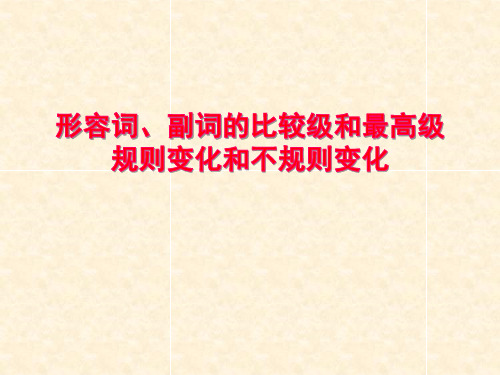
直,去,双,的形容词/副词 比较级后直接+er, 最高级+est。 如: clever — cleverer — cleverest few — fewer — fewest small — smaller — smallest
其实,世上最温暖的语言,“ 不是我爱你,而是在一起。” 所以懂得才是最美的相遇!只有彼此以诚相待,彼此尊重, 相互包容,相互懂得,才能走的更远。 相遇是缘,相守是爱。缘是多么的妙不可言,而懂得又是多么的难能可贵。否则就会错过一时,错过一世! 择一人深爱,陪一人到老。一路相扶相持,一路心手相牵,一路笑对风雨。在平凡的世界,不求爱的轰轰烈烈;不求誓 言多么美丽;唯愿简单的相处,真心地付出,平淡地相守,才不负最美的人生;不负善良的自己。 人海茫茫,不求人人都能刻骨铭心,但求对人对己问心无愧,无怨无悔足矣。大千世界,与万千人中遇见,只是相识的 开始,只有彼此真心付出,以心交心,以情换情,相知相惜,才能相伴美好的一生,一路同行。 然而,生活不仅是诗和远方,更要面对现实。如果曾经的拥有,不能天长地久,那么就要学会华丽地转身,学会忘记。 忘记该忘记的人,忘记该忘记的事儿,忘记苦乐年华的悲喜交集。 人有悲欢离合,月有阴晴圆缺。对于离开的人,不必折磨自己脆弱的生命,虚度了美好的朝夕;不必让心灵痛苦不堪, 弄丢了快乐的自己。擦汗眼泪,告诉自己,日子还得继续,谁都不是谁的唯一,相信最美的风景一直在路上。 人生,就是一场修行。你路过我,我忘记你;你有情,他无意。谁都希望在正确的时间遇见对的人,然而事与愿违时, 你越渴望的东西,也许越是无情无义地弃你而去。所以美好的愿望,就会像肥皂泡一样破灭,只能在错误的时间遇到错的人。 岁月匆匆像一阵风,有多少故事留下感动。愿曾经的相遇,无论是锦上添花,还是追悔莫及;无论是青涩年华的懵懂赏 识,还是成长岁月无法躲避的经历……愿曾经的过往,依然如花芬芳四溢,永远无悔岁月赐予的美好相遇。 其实,人生之路的每一段相遇,都是一笔财富,尤其亲情、友情和爱情。在漫长的旅途上,他们都会丰富你的生命,使 你的生命更充实,更真实;丰盈你的内心,使你的内心更慈悲,更善良。所以生活的美好,缘于一颗善良的心,愿我们都能 善待自己和他人。 一路走来,愿相亲相爱的人,相濡以沫,同甘共苦,百年好合。愿有情有意的人,不离不弃,相惜相守,共度人生的每 一个朝夕……直到老得哪也去不了,依然是彼此手心里的宝,感恩一路有你!
形容词副词的比较级和最高级变化规则
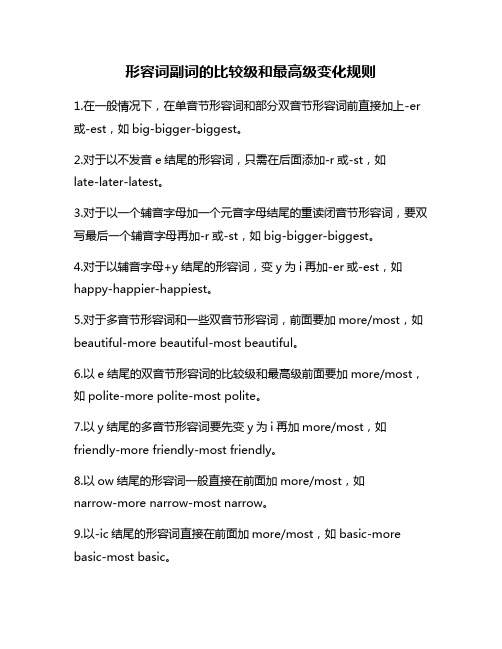
形容词副词的比较级和最高级变化规则1.在一般情况下,在单音节形容词和部分双音节形容词前直接加上-er 或-est,如big-bigger-biggest。
2.对于以不发音e结尾的形容词,只需在后面添加-r或-st,如late-later-latest。
3.对于以一个辅音字母加一个元音字母结尾的重读闭音节形容词,要双写最后一个辅音字母再加-r或-st,如big-bigger-biggest。
4.对于以辅音字母+y结尾的形容词,变y为i再加-er或-est,如happy-happier-happiest。
5.对于多音节形容词和一些双音节形容词,前面要加more/most,如beautiful-more beautiful-most beautiful。
6.以e结尾的双音节形容词的比较级和最高级前面要加more/most,如polite-more polite-most polite。
7.以y结尾的多音节形容词要先变y为i再加more/most,如friendly-more friendly-most friendly。
8.以ow结尾的形容词一般直接在前面加more/most,如narrow-more narrow-most narrow。
9.以-ic结尾的形容词直接在前面加more/most,如basic-more basic-most basic。
10.以-ive结尾的形容词直接在前面加more/most,如active-more active-most active。
11.以-able结尾的形容词直接在前面加more/most,如comfortable-more comfortable-most comfortable。
12.以-ful结尾的形容词直接在前面加more/most,如beautiful-more beautiful-most beautiful。
13.以-al结尾的形容词直接在前面加more/most,如usual-more usual-most usual。
形容词副词比较级最高级的变化规则

形容词副词比较级最高级的变化规则1. 引言大家好!今天咱们来聊聊形容词和副词的比较级和最高级的变化规则。
简单说,就是怎么用更形象、更生动的方式描述事物。
比如,你会说某件事“更好”还是“最棒”?这是比较级和最高级的妙处!准备好了吗?咱们一步一步来搞懂这些变化规则。
2. 形容词的比较级和最高级2.1 规则一:单音节形容词首先,单音节的形容词(如“高”、“大”)变化很直接。
你只需在形容词后加“er”就能变成比较级,加“est”则变成最高级。
比如“tall”变成“taller” (更高),再变成“tallest” (最高)。
是不是很简单?2.2 规则二:以“e”结尾的形容词。
有些单音节形容词以“e”结尾,比如“late”。
这些词只需要加上“r”或“st”。
所以,“late”变成“later” (更晚),然后是“latest” (最晚)。
对了,记住只加“r”和“st”,可别多加个“e”哦。
2.3 规则三:双音节或多音节形容词。
双音节的形容词(如“美丽的”)就有点复杂了。
一般情况下,比较级前面加“more”,最高级前面加“most”。
比如“beautiful”变成“more beautiful” (更美丽),再变成“most beautiful” (最美丽)。
听起来是不是很优雅?3. 副词的比较级和最高级3.1 规则一:单音节副词对于单音节副词(如“快”),规则和形容词一样。
加“er”做比较级,加“est”做最高级。
比如“fast”变成“faster” (更快),然后是“fastest” (最快)。
简单明了吧!3.2 规则二:以“ly”结尾的副词。
以“ly”结尾的副词,比如“quickly”,变化就要用“more”和“most”了。
比如“quickly”变成“more quickly” (更快地),再变成“most quickly” (最快地)。
这样用起来是不是有点儿考究呢?4. 特别的变化规则4.1 不规则变化有些形容词和副词可不按常规来,比如“good”和“well”。
形容词副词比较级和最高级规律和不规则变化
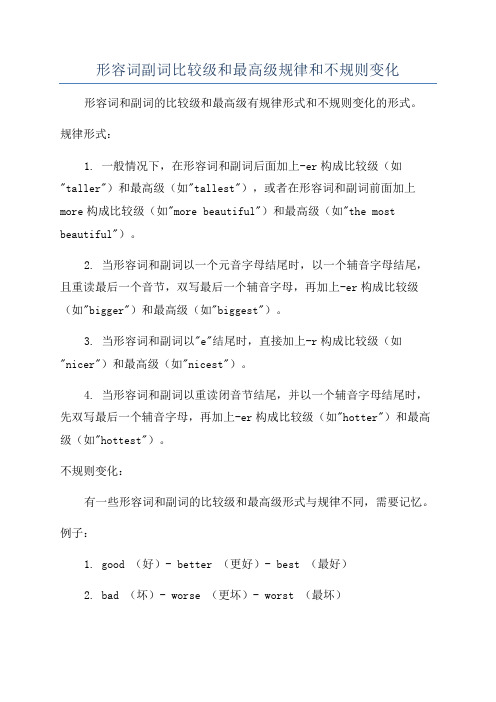
形容词副词比较级和最高级规律和不规则变化形容词和副词的比较级和最高级有规律形式和不规则变化的形式。
规律形式:1. 一般情况下,在形容词和副词后面加上-er构成比较级(如"taller")和最高级(如"tallest"),或者在形容词和副词前面加上more构成比较级(如"more beautiful")和最高级(如"the most beautiful")。
2. 当形容词和副词以一个元音字母结尾时,以一个辅音字母结尾,且重读最后一个音节,双写最后一个辅音字母,再加上-er构成比较级(如"bigger")和最高级(如"biggest")。
3. 当形容词和副词以"e"结尾时,直接加上-r构成比较级(如"nicer")和最高级(如"nicest")。
4. 当形容词和副词以重读闭音节结尾,并以一个辅音字母结尾时,先双写最后一个辅音字母,再加上-er构成比较级(如"hotter")和最高级(如"hottest")。
不规则变化:有一些形容词和副词的比较级和最高级形式与规律不同,需要记忆。
例子:1. good (好)- better (更好)- best (最好)2. bad (坏)- worse (更坏)- worst (最坏)3. far (远)- further/farther (更远)- furthest/farthest (最远)4. many/much (多)- more (更多)- most (最多)5. little (少)- less (更少)- least (最少)6. well (好)- better (更好)- best (最好)7. badly (坏)- worse (更坏)- worst (最坏)需要注意的是,有些形容词和副词只有原级,没有比较级和最高级,如perfect(完美的)、unique(独一无二的)、correct(正确的)等。
形容词和副词的比较级和最高级(完美版)
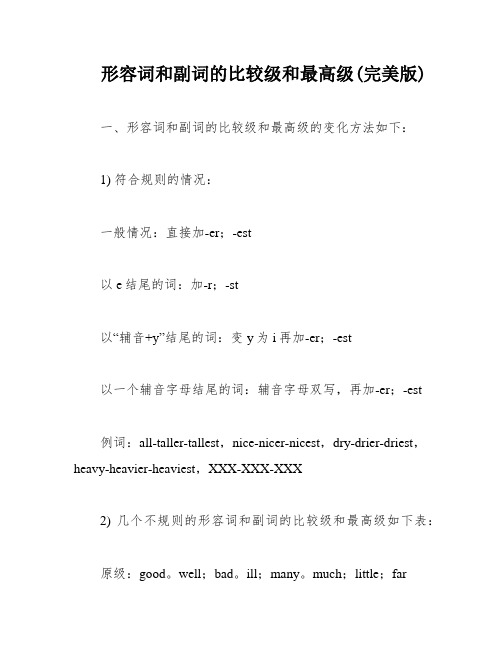
形容词和副词的比较级和最高级(完美版)一、形容词和副词的比较级和最高级的变化方法如下:1) 符合规则的情况:一般情况:直接加-er;-est以e结尾的词:加-r;-st以“辅音+y”结尾的词:变y为i再加-er;-est以一个辅音字母结尾的词:辅音字母双写,再加-er;-est例词:all-taller-tallest,nice-nicer-nicest,dry-drier-driest,heavy-heavier-heaviest,XXX-XXX-XXX2) 几个不规则的形容词和副词的比较级和最高级如下表:原级:good。
well;bad。
ill;many。
much;little;far二、形容词和副词比较级的用法:级别比较程度肯定表达方式和意义例句(备注)原级同等程度 As+原级+as (像……一样) XXX。
not + so (as) +原级+as (不如……那样) English is not so difficult as science。
比较级不同程度 (用于两者比较) 比较级+than (比……) XXX XXX。
比较级前面可以加much。
far。
even。
still。
a lot。
a little。
a bit等程度加深 I like pork better than beef。
最高级同一范围内的最高程度 The +比较级,the +比较级(越……,越……) XXX gets。
the XXX.The XXX reads。
the better their XXX。
This is because reading can XXX.The highest degree of something is expressed using the superlative form。
which is used for three or more things。
Forexample。
"Spring is the best season of the year." Another example is "Lin Tao jumped the farthest of all."When using the superlative form with an adverb。
形容词副词的比较级和最高级变化规则

聚焦形容词与副词的比较概述:大多数形容词与副词有三个级:原级(即原形)、比较级与最高级。
形容词与副词按变化可以分为规则形容词词与副词与不规则形容词词与副词规则I.形容词词与副词的比较级与最高级变化规则如下:一.所有单音节与部分双音节如何变比较级与最高级1 一般在词末尾加er变比较级,加est变最高级strong —stronger -strongest small--smaller--smallest hard→harder →hardest fast→faster →fast est2 如果以e结尾,只加r 与stnice--nicer--nicest fine--finer--finest3 以重读闭音节,末尾只有一个辅音字母,须先双写这个辅音字母,再加er与estsad--sadder-- saddest big--bigger--biggest hot--hotter --hottest4 以辅音字母加y结尾的词,把y变成i,再加er与est,angry--angrier-angriest early→earlier →earl iest hungry-hungrier-hungriest但是,开放类副词即形容词加ly结尾变成的副词加more或most.如quickly →more quickly →most quickly quietly →more quietly →most quietlyslowly—more slowly—most slowly[注]:early中的ly不是后缀,故把y变i再加er与est二大部分双音节与所有多音节词都在其前面加more变比较级,加most变最高级different -more different -most differentbeautiful--more beautiful--the most beautifulexpensive--more expensive--the most expensive但是,以形容前缀un结尾的三音节形容词不适合上述情况,如unhappy,untidy,我们可以说:unhappier→unhappiest, untidier→untidiest三,不规则形容词与副词的比较级与最高级good / well -- better-- best badly/bad / ill -- worse -- worstmany/ much-- more--most little -- less-- least far-- farther--farthest 或further--furthestII,形容词与副词的原级、比较级与最高级的基本用法一、原级比较的基本用法:原级比较由“….as+形容词或副词原形+as…”构成译:前者与后者一样eg:Alice is as tall as her younger sister.爱丽丝与她妹妹一样高Liu Dehua sings as well as Joy Zhou刘德华与周杰林伦唱得一样好。
形容词和副词的比较级和最高级
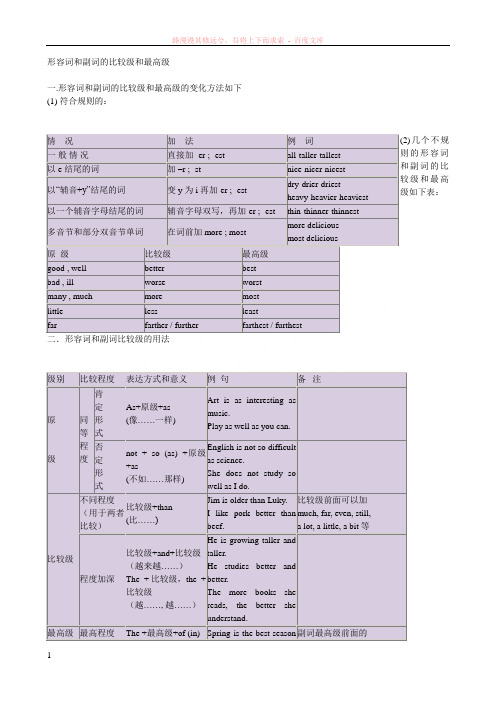
形容词和副词的比较级和最高级一.形容词和副词的比较级和最高级的变化方法如下 (1) 符合规则的: (2)几个不规则的形容词和副词的比较级和最高级如下表:原 级 比较级 最高级 good , well better best bad , ill worse worst many , much more most little lessleastfarfarther / furtherfarthest / furthest二.形容词和副词比较级的用法 级别比较程度 表达方式和意义 例 句备 注原 级同 等 程 度 肯 定 形 式 As+原级+as (像……一样)Art is as interesting as music. Play as well as you can.否 定形 式not + so (as) +原级+as (不如……那样)English is not so difficultas science.She does not study sowell as I do.比较级不同程度(用于两者比较)比较级+than(比……)Jim is older than Luky. I like pork better than beef. 比较级前面可以加 much, far, even, still, a lot, a little, a bit 等程度加深比较级+and+比较级 (越来越……) The + 比较级,the +比较级 (越……, 越……) He is growing taller andtaller. He studies better and better. The more books she reads, the better sheunderstand.最高级 最高程度 The +最高级+of (in) Spring is the best season 副词最高级前面的情 况 加 法 例 词 一 般 情 况 直接加 -er ; -est all-taller-tallest 以e 结尾的词 加 –r ; -stnice-nicer-nicest 以“辅音+y”结尾的词 变y 为i 再加-er ; -est dry-drier-driestheavy-heavier-heaviest 以一个辅音字母结尾的词 辅音字母双写,再加-er ; -est thin-thinner-thinnest 多音节和部分双音节单词 在词前加 more ; mostmore delicious most delicious(用于三者或三者以上)(最……)of the year.Lin Tao jumped (the)farthest of all.the 往往省略注意:有些形容词,如dead, empty, round, sure, woolen 等受本身含义的限制,没有比较级。
形容词和副词比较级变化规则

形容词和副词比较级、最高级变化规则1.一般在单音节词尾加-er, - esthard- harder-hardest fast-faster-fastest2.以不发音的字母e结尾的单音节词和以-le结尾的双音节词直接加-r,- stlate - later- latest; gentle –gentler –gentlest;noble–nobler--noblest ; simple- simpler- simplest3.以辅元辅结尾且重读的,双写最后的一个辅音字母,再加-er,-esthot-hotter-hottest big-bigger-biggest fat-fatter-fattest4.以辅音字母+y结尾的双音节词,变y 为i,再加-er,- esteasy-easier-easiest heavy-heavier-heaviest busy-busier-busiest happy-happier-happiest friendly-friendlier-friendliest lovely-lovelier-loveliestearly-earlier-earliest( likely有两种:likelier, likeliest或more likely, most likely,但常用于more likely,如be more likely to do sth.)5.由形容词+ly变化的双音节副词,在前面加more, mostslowly-more slowly-most slowlywarmly-more warmly-most warmly6.少数双音节词直接加-er,-estclever-cleverer-cleverest(more clever, most clever也对) narrow-narrower-narrowest, quiet-quieter-quietestcommon-commoner-commonest (more common, most common也对)cruel-crueler-cruelest7.多数双音节加-more,-mostcareful –more careful - most carefuluseful-more useful-most usefulactive-more active-most active often-more often –most oftenexact--more exact –most exact8.不规则变化级good/well - better - best ,bad/badly/ill - worse - worstmany/much - more - most ,little -less -leastfar - farther/further - farthest/furthest ,old - older/elder - oldest/eldest特别提醒:◇farther指“距离更远”,further指“程度更深”。
形容词和副词比较级和最高级变化规则
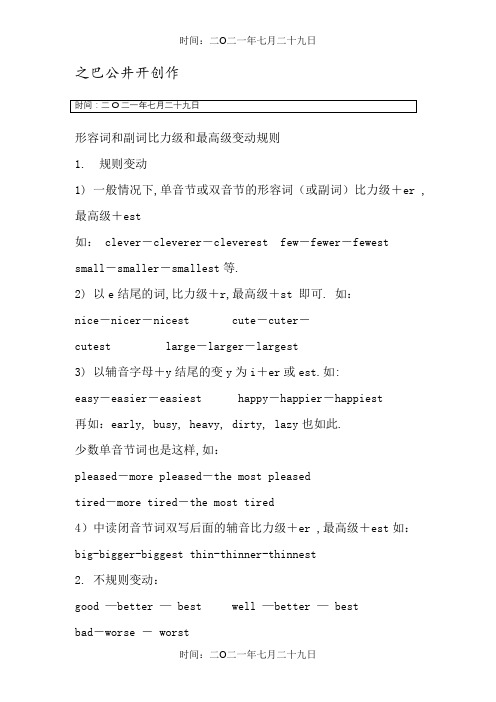
形容词和副词比力级和最高级变动规则1. 规则变动1) 一般情况下,单音节或双音节的形容词(或副词)比力级+er ,最高级+est如: clever-cleverer-cleverest few-fewer-fewest small-smaller-smallest等.2) 以e结尾的词,比力级+r,最高级+st 即可. 如:nice-nicer-nicest cute-cuter-cutest large-larger-largest3) 以辅音字母+y结尾的变y为i+er或est.如:easy-easier-easiest happy-happier-happiest再如:early, busy, heavy, dirty, lazy也如此.少数单音节词也是这样,如:pleased-more pleased-the most pleasedtired-more tired-the most tired4)中读闭音节词双写后面的辅音比力级+er ,最高级+est如:big-bigger-biggest thin-thinner-thinnest2. 不规则变动:good —better — best well —better — bestbad-worse - worstmany / much — more — mostfar — farther —farthest (距离远)far — further — furthest (水平深)old — elder — eldest (长幼)old — older —oldest (年龄)Step 2 中考链接1. 比力级考点① 比力级修饰问题a little, a bit, even, still, much, a lot, far 等可修饰比力级.e.g. Tom is a little taller than Jim.This book is much more interesting than that one.② 同级比力e.g. The weather in Beijing is colder than tha t in Xi’an.Our school is bigger than yours.③ the + 比力级e.g. Lucy is the fatter of the two girls.④ “a/an + 比力级” 暗示“又一,再一”e.g. Lily has a doll, but she wants a bigger one.⑤ 隐性比力(没有than的情况)e.g. Who runs faster, Lucy or Lily?You’d better come e arlier next time.He worked hard last term, but he works even harder this term.⑥ 越来越......a. 比力级 + and + 比力级b. the + 比力级 + 句子,the + 比力级 + 句子a. e.g. It’s getting colder and colder.The more you exercise, the better you are.2. 最高级考点说明:形容词的最高级前必需加the; 副词的最高级前省略the.① 范围问题e.g. Tom is the tallest student in the class.Spring is the best season of the year.② “......之一”问题e.g. Beijing is one of the biggest cities in the world.③ “the + 序数词 + 最高级”e.g. I think he is the second tallest boy in his class.3. 比力级和最高级的转换e.g. Tom is the tallest student in the class.= Tom is taller than any other student in the class.= Tom is taller than all the other students in the class.= No other students are taller than Tom.2. 同级比力① as + adj./ad v. + ase.g. She is as thin as Lily.He writes as carefully as Linda.② not + as/so + adj./adv. + ase.g. Tony didn't run so fast as Carter 中考真题1. Our family has bought a car so we can travel _____ than before.A. most easilyB. less easilyC. easilyD. moreeasily2. My father told me a story last night. It is ____ one I’ve ever heard.A. the funniestB. funniestC. funnierD. thefunnier3. The _____ friends you have, the ____ you will be.A. more, happyB. many, happyC. more, happierD. many, happier4. When he heard a cry for help, he ran out as _______ as he could.A. hardlyB.。
形容词和副词的比较级和最高级
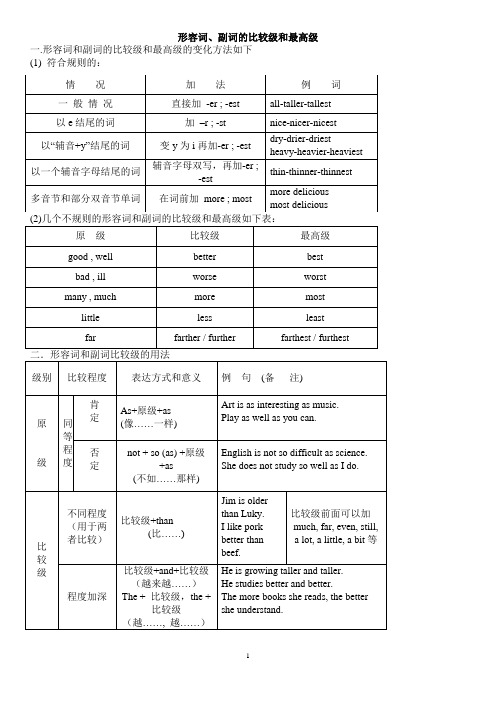
形容词、副词的比较级和最高级一.形容词和副词的比较级和最高级的变化方法如下(1) 符合规则的:( 1)和冠词连用the +形容词原级+v(复),指一类人或物the +形容词比较级,指两者中“较…的”的那一个,eg. the younger of thea/ an +形容词比较级eg. The pen is expensive. I want a cheaper one.( a) +most+形容词最高级“非常…”eg. a most beautiful city( 2 ) 相关结构a. 原级比较:肯定句as….as…., 否定句not so / as….as…..b.比较句:比较级+than….或more (less) ….than…..The furniture in this shop is less beautiful than that in that shop.c.比较级+and+比较级或more and more+比较级“越来越… ”richer and richer, more and more interestingd. The more….., the more…..“越…,越…”The more you look at the picture, the better you will like it.e. 比较级+than any other +n. (单)(适用于范围一致时)(all) other +n.(复)any +n.(单) (适用于范围不一致时)He is taller than any other student / all other students in his class.any student in my class.f. 倍数表达法。
A is three(four, etc.)times the size(height, length etc.)of B.A is three(four, etc.)times as big(high, long, etc.)as B.A is three (four, etc.)times bigger(higher, longer, etc.)than B.用times 表倍数通常用于三倍以上,两倍可以用twice或double.The new building is four times the size (the height)of the old one.Asia is four times as large as Europe.Your school is three times bigger than ours.g. 最高级+of/ in/ among….He is the tallest of the three/ among them/ in is class.形容词、副词的比较级和最高级专项练习(一)写出下列形容词与副词的比较级与最高级形式:long __ wide __ ___ fat _ ___ heavy _____ ____ slow _____ ____ few _____ ____ brightly ___ _____ important ___ _____ far ____ ______ quickly ____ ____ happy ___ ____ many ___ ____ interesting __ __good ___ ___(二)用所给词的正确形式填空:1. He ran ______ than all the others. He ran _______ of all. ( fast )2. James played as ______ as you. Mary played _______of all. ( well )3. She waited ________ than she usually did. ( long )4. I walked _______ than the rest. I walked _______ of all. ( far )5. My friend came ________ than Pual and Mike. ( late )6. Among the three boys he works ________. ( hard )7. Bob left school ______ in his class yesterday. ( late )8. He swims as ______ as I do. ( badly )9. Who did _______ in the 100-metre race, Jim or Tim? ( badly )10. Both Li Ming and Li Hong sang __________, but I sang _______ of all. ( badly )11. Peter is as _______ as Tom. Benny is _____ than Tom. David is ______ of all. ( fat )12. Li Li found _________ mushrooms than I did. ( many )13. The elephant is ________ than any other animals. ( big )14. Man is ________ than animals. ( much clever )15. Lesson Two is a bit ________ than Lesson One. ( easy )16. I’m _______ boy under the sun. ( happy )17. Today is ________ than yesterday. ( hot )18. An elephant is _______ than a tiger. It is _______ animal on land. ( big )19. Mr. Li is _______ than your uncle. ( thin )20. Which book is _________, yours or mine? ( thick )21. This park is much _______ than that one. ( beautiful )22. The first book is more useful than the second one.The second book is ______ than the first one. ( useful )23. Allan is _______ of the three boys. ( strong )24. His marks are _______ than his friend’s ( bad )25. It is _______ to do this maths problem than to do that one. ( easy )26. My house is ________ to the farm than yours. ( far )27. My work is more important than yours. Your work is ________ than mine. ( important )28. Climbing this hill is _________. Climbing that hill is ________. Climbing Mt. Everest is _______ of all. ( dangerous )29. Mt. Everest is _________ than the Mont-Blanc. ( high )30. My mother drives very carefully. She is a _________ driver than my father. ( careful ).31. Of the two girls, I find Lucy the _______ (clever).32. Gold(黄金) is ______ (little) useful than iron(铁).33. My sister is two years _______ (old ) than I.34. John’s parents have four daughters, and she is the _____ (young) child.35. The _____ (cheap) bags are the not usually the best ones.36. The short one is by far _______ expensive of the five.37. The boy is not so ______ (interesting) as his brother.38. Dick sings _____ (well), she sings ______(well) than John, but Mary sings______(well) in her class.39. She will be much ______ (happy) in her mew house.40. This dress is ______ that.(twice, as…as…, expensive)(三)选择填空:1. He feels _____ today than yesterday. A. tired B. more tired C. more tireder D. much tired2. Which do you like _____, coffee, tea or milk? A. the worst B. worse C. the worse D. worst3. Of the two toys, the child chose_____.A. the expensive oneB. one most expensiveC. a least expensiveD. the most expensive of them4. The line is ____ than that one. A. more longer B. not longer C. much more longer D. many more longer5. The earth is _____ the moon.A. as 49 times big asB. 49 times as bigger asC. 49 times as big asD.as big as 49 times6. The book is ____ of the two. A. thinner B. the thinner C. more thinner D. the thinnest7. She looks _____ than she does. A. the more older B. very older C. much older D. more older8. The garden is becoming ______.A. more beautiful and moreB. more beautiful and beautifulC. more and more beautifulD. more beautiful and beautifuler9. They competed(比赛)to see who could work _____.A. the fastest and bestB. the faster and the betterC. fastest and betterD. faster and better10.______ hurry, _______speed. A. More, less B. Much, little C. The more, the less D. The much, the little11. This kind of coffee is different ______.A. and it is also betterB. and better than the otherC. but also than othersD. from the other, and better(四)翻译句子:1.本书跟那本书一样有趣。
形容词和副词比较级和最高级变化规则

形容词和副词比较级和最高级变化规则1. 规则变化1) 一般情况下,单音节或双音节的形容词(或副词)比较级+er ,最高级+est 如: clever-cleverer-cleverest few-fewer-fewestsmall-smaller-smallest等。
2) 以e结尾的词,比较级+r,最高级+st 即可。
如:nice-nicer-nicest cute-cuter-cutest large-larger-largest3) 以辅音字母+y结尾的变y为i+er或est。
如:easy-easier-easiest happy-happier-happiest再如:early, busy, heavy, dirty, lazy也如此。
少数单音节词也是这样,如:pleased-more pleased-the most pleasedtired-more tired-the most tired4)中读闭音节词双写后面的辅音比较级+er ,最高级+est如:big-bigger-biggest thin-thinner-thinnest2. 不规则变化:good —better — best well —better — bestbad-worse - worstmany / much — more — mostfar — farther —farthest (距离远)far — further — furthest (程度深)old — elder — eldest (长幼)old — older —oldest (年龄)Step 2 中考链接1. 比较级考点①比较级修饰问题a little, a bit, even, still, much, a lot, far 等可修饰比较级。
e.g. Tom is a little taller than Jim.This book is much more interesting than that one.②同级比较e.g. The weather in Beijing is colder than that in Xi’an.Our school is bigger than yours.③ the + 比较级e.g. Lucy is the fatter of the two girls.④“a/an + 比较级” 表示“又一,再一”e.g. Lily has a doll, but she wants a bigger one.⑤隐性比较(没有than的情况)e.g. Who runs faster, Lucy or Lily?You’d better come earlier next time.He worked hard last term, but he works even harder this term.⑥越来越......a. 比较级 + and + 比较级b. the + 比较级 + 句子,the + 比较级 + 句子a. e.g. It’s getting colder and colder.The more you exercise, the better you are.2. 最高级考点说明:形容词的最高级前必须加the; 副词的最高级前省略the。
形容词、副词比较级、最高级变化规则及用法
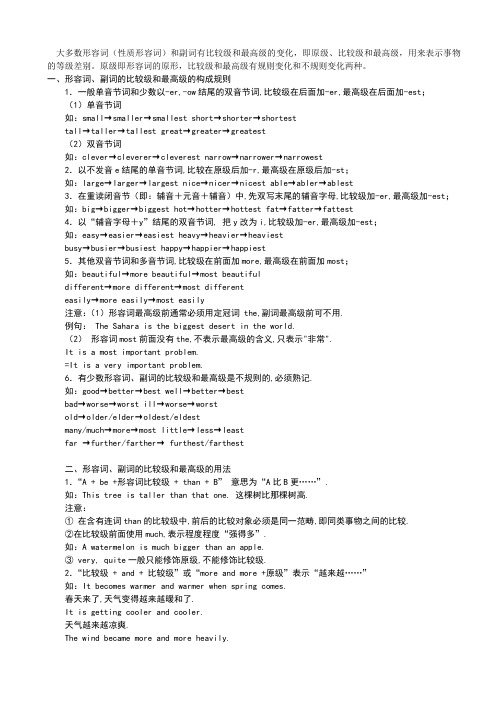
大多数形容词(性质形容词)和副词有比较级和最高级的变化,即原级、比较级和最高级,用来表示事物的等级差别。
原级即形容词的原形,比较级和最高级有规则变化和不规则变化两种。
一、形容词、副词的比较级和最高级的构成规则1.一般单音节词和少数以-er,-ow结尾的双音节词,比较级在后面加-er,最高级在后面加-est;(1)单音节词如:small→smaller→smallest short→shorter→shortesttall→taller→tallest great→greater→greatest(2)双音节词如:clever→cleverer→cleverest narrow→narrower→narrowest2.以不发音e结尾的单音节词,比较在原级后加-r,最高级在原级后加-st;如:large→larger→largest nice→nicer→nicest able→abler→ablest3.在重读闭音节(即:辅音+元音+辅音)中,先双写末尾的辅音字母,比较级加-er,最高级加-est;如:big→bigger→biggest hot→hotter→hottest fat→fatter→fattest4.以“辅音字母+y”结尾的双音节词, 把y改为i,比较级加-er,最高级加-est;如:easy→easier→easiest heavy→heavier→heaviestbusy→busier→busiest happy→happier→happiest5.其他双音节词和多音节词,比较级在前面加more,最高级在前面加most;如:beautiful→more beautiful→most beautifuldifferent→more different→most differenteasily→more easily→most easily注意:(1)形容词最高级前通常必须用定冠词 the,副词最高级前可不用.例句: The Sahara is the biggest desert in the world.(2)形容词most前面没有the,不表示最高级的含义,只表示"非常".It is a most important problem.=It is a very important problem.6.有少数形容词、副词的比较级和最高级是不规则的,必须熟记.如:good→better→best well→better→bestbad→worse→worst ill→worse→worstold→older/elder→oldest/eldestmany/much→more→most little→less→leastfar →further/farther→ furthest/farthest二、形容词、副词的比较级和最高级的用法1.“A + be +形容词比较级 + than + B”意思为“A比B更……”.如:This tree is taller than that one. 这棵树比那棵树高.注意:①在含有连词than的比较级中,前后的比较对象必须是同一范畴,即同类事物之间的比较.②在比较级前面使用much,表示程度程度“强得多”.如:A watermelon is much bigger than an apple.③ very, quite一般只能修饰原级,不能修饰比较级.2.“比较级 + and + 比较级”或“more and more +原级”表示“越来越……”如:It becomes warmer and warmer when spring comes.春天来了,天气变得越来越暖和了.It is getting cooler and cooler.天气越来越凉爽.The wind became more and more heavily.风变得越来越大.Our school is becoming more and more beautiful.我们的学校变得越来越美丽.3.在含有or的选择疑问句中,如果有两者供选择,前面的形容词要用比较级形式.如:Who is taller,Tim or Tom? 谁更高,Tim还是Tom?4. “the +比较级……, the+比较级”,表示“越……越……”.The more money you make, the more you spend.钱你赚得越多,花得越多.The sooner,the better.越快越好.5. 表示倍数的比较级用法:①. A is …times the size /height/length/width of B.如:The new building is three times the height of the old one.这座新楼比那座旧楼高三倍.(新楼是旧楼的四倍高)②. A is …times as big /high/long/wide/large as B.如:Asia is four times as large as Europe.亚洲是欧洲的四倍大.(亚洲比欧洲大三倍)③. A is …times larger /higher/longer/wider than B.如:Our school is twice bigger than yours.我们学校比你们学校大两倍.6.形容词、副词的最高级形式主要用来表示三者或三者以上人或事物的比较,表示“最……”的意思.句子中有表示范围的词或短语.如:of the three, in our class等等.如:He is the tallest in our class.他在我们班里是最高的.7."否定词语+比较级","否定词语+ so… as"结构表示最高级含义.Nothing is so easy as this.=Nothing is easier than this.=This is the easiest thing.8. 比较级与最高级的转换:Mike is the most intelligent in his class.Mike is more intelligent than any other student in his class7.修饰比较级和最高级的词1)可修饰比较级的词①.a bit, a little, rather, much, far, by far, many, a lot, lots, a great deal, any, still, even等.②. 还可以用表示倍数的词或度量名词作修饰语.③. 以上词(除by far)外,必须置于比较级形容词或副词的前面.注意:使用最高级要注意将主语包括在比较范围内.(错) Tom is the tallest of his three brothers.(对) Tom is the tallest of the three brothers.2)下列词可修饰最高级:by far, far, much, mostly, almost.This hat is nearly / almost the biggest.注意:a. very可修饰最高级,但位置与much不同.This is the very best.This is much the best.b. 序数词通常只修饰最高级.Africa is the second largest continent.8.要避免重复使用比较级.(错) He is more cleverer than his brother.(对) He is more clever than his brother.(对) He is cleverer than his brother.9.要避免将主语含在比较对象中.(错) China is larger that any country in Asia.(对) China is larger than any other country in Asia.10.要注意对应句型,遵循前后一致的原则.The population of Shanghai is larger than that of Beijing.It is easier to make a plan than to carry it out.11.要注意冠词的使用,后有名词的时候,前面才有可能有名词.比较:Which is larger, Canada or Australia?Which is the larger country, Canada or Australia?She is taller than her two sisters.She is the taller of the two sisters.常用的不规则变化的形容词的比较级和最高级:原级------比较级------最高级good------better------best well------better------bestmany------more------most much------more------mostbad------worse------worst 坏的 ill--------worse-------worst 病的few------less-------least 少数几个 little-------less------least 少数一点儿far------further------furthest 更进一步,程度 far------farther------farthest 更远,路程old-------older------oldest 年老的(指年纪) old------elder-------eldest 年老的(指兄弟姐妹的排行)形容词前如加 less 和 least 则表示"较不"和"最不"important 重要 less important 较不重要 least important 最不重要。
形容词、副词比较级和最高级规律和不规则变化
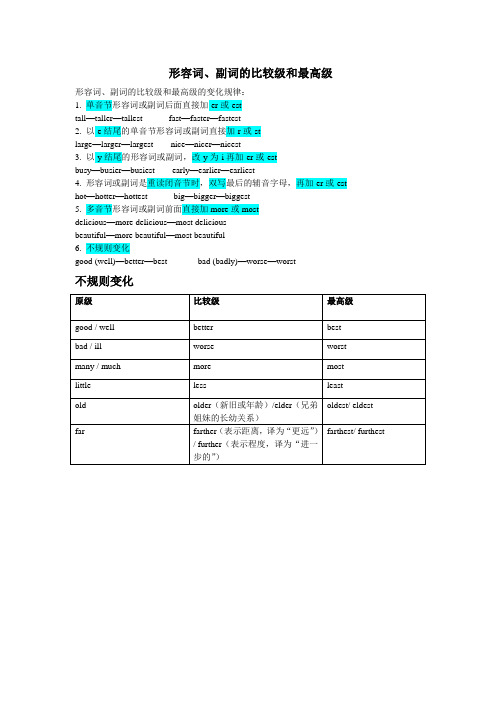
busy—busier—busiest early—earlier—earliest
4.形容词或副词是重读闭音节时,双写最后的辅音字母,再加-er或-est
hot—hotter—hottest big—bigger—biggest
5.多音节形容词或副词前面直接加more或most
better
best
bad / ill
worse
worst
many / much
more
most
little
less
least
old
older(新旧或年龄)/elder(兄弟姐妹的长幼关系)
oldeБайду номын сангаасt/ eldest
far
farther(表示距离,译为“更远”)/ further(表示程度,译为“进一步的”)
delicious—more delicious—most delicious
beautiful—more beautiful—most beautiful
6.不规则变化
good (well)—better—best bad (badly)—worse—worst
不规则变化
原级
比较级
最高级
good / well
形容词、副词的比较级和最高级
形容词、副词的比较级和最高级的变化规律:
1.单音节形容词或副词后面直接加-er或-est
tall—taller—tallest fast—faster—fastest
2.以-e结尾的单音节形容词或副词直接加-r或-st
large—larger—largest nice—nicer—nicest
- 1、下载文档前请自行甄别文档内容的完整性,平台不提供额外的编辑、内容补充、找答案等附加服务。
- 2、"仅部分预览"的文档,不可在线预览部分如存在完整性等问题,可反馈申请退款(可完整预览的文档不适用该条件!)。
- 3、如文档侵犯您的权益,请联系客服反馈,我们会尽快为您处理(人工客服工作时间:9:00-18:30)。
形容词和副词比较级和最高级变化规则
1. 规则变化
1) 一般情况下,单音节或双音节的形容词(或副词)比较级+er ,最高级+est 如: clever-cleverer-cleverest few-fewer-fewest
small-smaller-smallest等。
2) 以e结尾的词,比较级+r,最高级+st 即可。
如:
nice-nicer-nicest cute-cuter-cutest large-larger-largest
3) 以辅音字母+y结尾的变y为i+er或est。
如:
easy-easier-easiest happy-happier-happiest
再如:early, busy, heavy, dirty, lazy也如此。
少数单音节词也是这样,如:
pleased-more pleased-the most pleased
tired-more tired-the most tired
4)中读闭音节词双写后面的辅音比较级+er ,最高级+est如:
big-bigger-biggest thin-thinner-thinnest
2. 不规则变化:
good —better — best well —better — best
bad-worse - worst
many / much — more — most
far — farther —farthest (距离远)
far — further — furthest (程度深)
old — elder — eldest (长幼)
old — older —oldest (年龄)
Step 2 中考链接
1. 比较级考点
①比较级修饰问题
a little, a bit, even, still, much, a lot, far 等可修饰比较级。
e.g. Tom is a little taller than Jim.
This book is much more interesting than that one.
②同级比较
e.g. The weather in Beijing is colder than that in Xi’an.
Our school is bigger than yours.
③ the + 比较级
e.g. Lucy is the fatter of the two girls.
④“a/an + 比较级” 表示“又一,再一”
e.g. Lily has a doll, but she wants a bigger one.
⑤隐性比较(没有than的情况)
e.g. Who runs faster, Lucy or Lily?
You’d better come earlier next time.
He worked hard last term, but he works even harder this term.
⑥越来越......
a. 比较级 + and + 比较级
b. the + 比较级 + 句子,the + 比较级 + 句子
a. e.g. It’s getting colder and colder.
The more you exercise, the better you are.
2. 最高级考点
说明:形容词的最高级前必须加the; 副词的最高级前省略the。
①范围问题
e.g. Tom is the tallest student in the class.
Spring is the best season of the year.
②“......之一”问题
e.g. Beijing is one of the biggest cities in the world.
③“the + 序数词 + 最高级”
e.g. I think he is the second tallest boy in his class.
3. 比较级和最高级的转换
e.g. Tom is the tallest student in the class.
= Tom is taller than any other student in the class.
= Tom is taller than all the other students in the class.
= No other students are taller than Tom.
2. 同级比较
① as + adj./adv. + as
e.g. She is as thin as Lily.
He writes as carefully as Linda.
② not + as/so + adj./adv. + as
e.g. Tony didn't run so fast as Carter
中考真题
1. Our family has bought a car so we can travel _____ than before.
A. most easily
B. less easily
C. easily
D. more easily
2. My father told me a story last night. It is ____ one I’ve ever heard.
A. the funniest
B. funniest
C. funnier
D. the funnier
3. The _____ friends you have, the ____ you will be.
A. more, happy
B. many, happy
C. more, happier
D. many, happier
4. When he heard a cry for help, he ran out as _______ as he could.
A. hardly
B. quickly
C. finally
D. slowly
5. This place is not big enough for Lucy’s birthday party. We should find a _____ one.
A. big
B.
small
C. bigger
D. smaller。
